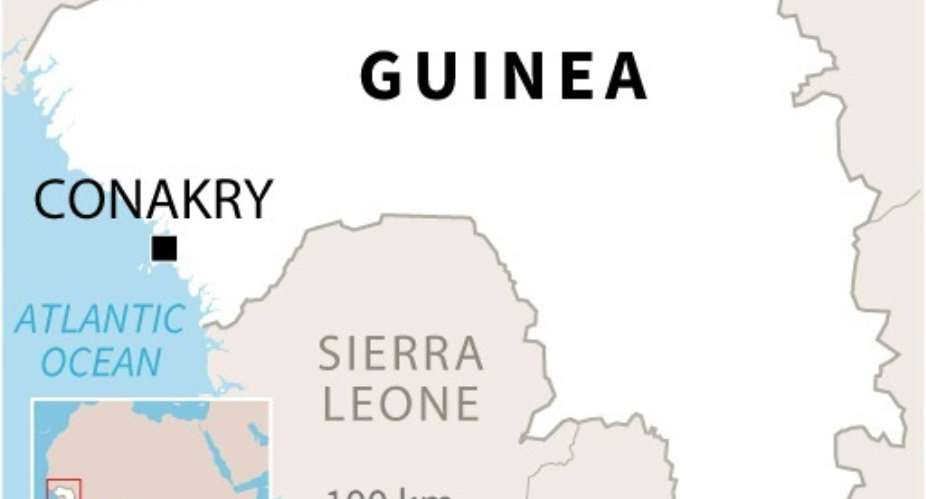Guinea is among the world's poorest countries, despite significant mineral resources, and has a turbulent political history.
Here is some background ahead of a controversial constitutional referendum and parliamentary elections on Sunday.
Muslim-majority
Situated on the bulge of West Africa, the French-speaking country is home to around 12.4 million people (World Bank 2018) from around two dozen ethnic groups.
The vast majority are Muslim while around 15 percent are Christian or have indigenous beliefs.
About 55 percent live below the national poverty line, according to the UN.
Military coups
Guinea won independence from France in 1958, becoming Africa's first Marxist state under President Ahmed Sekou Toure, who ruled for 26 years.
Rights groups accuse his regime of the death or the disappearance of about 50,000 people, and the exile of hundreds of thousands.
Days after Toure's death in 1984, General Lansana Conte seized control and remained in charge until his own death 24 years later.
Multi-party rule was introduced in 1990 but elections were widely believed to be rigged.
Another military coup brought Captain Moussa Dadis Camara to power in 2008 and plunged the country into chaos. He survived a shot to the head the following year but was removed from office.
First free election
Guinea held its first democratic elections in November 2010 and long-time political opponent Alpha Conde was voted president. He was voted in again in 2015, the constitution providing for two terms.
Long-promised legislative elections took place in September 2013, won by Conde's Rally of the Guinean People (RPG).
After periods of turbulence marked by violence at opposition demonstrations, protests broke out again in October 2019 amid suspicions Conde was trying to manipulate the constitution to secure a third term. At least 31 people, including a gendarme, were killed.
Mineral wealth
Guinea is one of the world's biggest producers of bauxite, the ore used to produce aluminium. It is also rich in iron, gold, diamonds and oil.
Conde has enacted reforms to diversify the economy, including the mining sector which attracts foreign investment but is hobbled by poor infrastructure.
Agriculture remains the main source of jobs.
According to the World Bank, per capita income in 2018 was just $830 (762 euros). Growth stood at around 10 percent in 2016-2017, falling to 5.8 percent in 2018.
Guinea is also plagued by corruption, listed as 138th of 180 countries on Transparency International's rankings for 2018.
Ebola
The deadliest epidemic of the tropical virus Ebola started in Guinea in December 2013, killing around 2,500 people there and affecting agriculture, mining, trade, transport and tourism.
The World Health Organization (WHO) declared the end of the epidemic in March 2016, after it had killed 11,300 people in the region.
Female genital mutilation is a widespread practice in Guinea, affecting 97 percent of women and girls in 2014, according to UNICEF.





 Former Kotoko Player George Asare elected SRC President at PUG Law Faculty
Former Kotoko Player George Asare elected SRC President at PUG Law Faculty
 2024 elections: Consider ‘dumsor’ when casting your votes; NPP deserves less — P...
2024 elections: Consider ‘dumsor’ when casting your votes; NPP deserves less — P...
 You have no grounds to call Mahama incompetent; you’ve failed — Prof. Marfo blas...
You have no grounds to call Mahama incompetent; you’ve failed — Prof. Marfo blas...
 2024 elections: NPP creates better policies for people like us; we’ll vote for B...
2024 elections: NPP creates better policies for people like us; we’ll vote for B...
 Don’t exchange your life for wealth; a sparkle of fire can be your end — Gender ...
Don’t exchange your life for wealth; a sparkle of fire can be your end — Gender ...
 Ghana’s newly installed Poland train reportedly involved in accident while on a ...
Ghana’s newly installed Poland train reportedly involved in accident while on a ...
 Chieftaincy disputes: Government imposes 4pm to 7am curfew on Sampa township
Chieftaincy disputes: Government imposes 4pm to 7am curfew on Sampa township
 Franklin Cudjoe fumes at unaccountable wasteful executive living large at the ex...
Franklin Cudjoe fumes at unaccountable wasteful executive living large at the ex...
 I'll 'stoop too low' for votes; I'm never moved by your propaganda — Oquaye Jnr ...
I'll 'stoop too low' for votes; I'm never moved by your propaganda — Oquaye Jnr ...
 Kumasi Thermal Plant commissioning: I pray God opens the eyes of leaders who don...
Kumasi Thermal Plant commissioning: I pray God opens the eyes of leaders who don...
